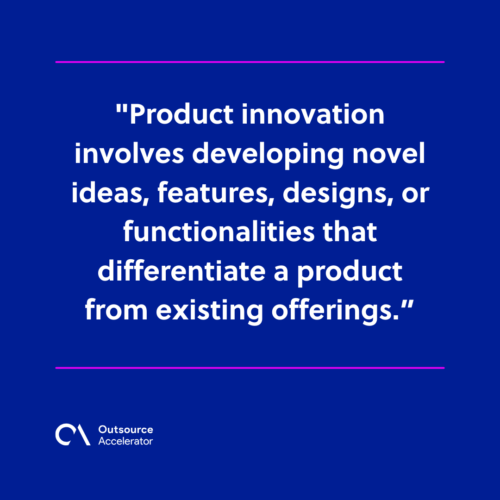What you must know about product innovation

With fierce competition and ever-growing customer demands, product innovation is the key to staying ahead. Businesses must continually adapt and improve their offerings to survive and thrive.
Product innovation is a driving force in shaping industries and captivating customers, from technological advancements to creative design and improved functionality.
This article looks into the importance of product innovation and how it can fuel business growth. We’ll discuss its various forms, the intricate process it entails, and some examples of its application in recent history.
What is product innovation?
Product innovation is the creation and introduction of new or improved products to the market. It involves developing novel ideas, features, designs, or functionalities that differentiate a product from existing offerings.
Companies identify opportunities, conduct research, test prototypes, and ultimately bring the innovation to market.
The goal of product innovation is to provide customers with superior products and services that meet their evolving needs. Doing so not only differentiates a company from its rivals but also drives growth in the marketplace.

2 types of product innovation
There are two primary types of product innovation, each with its own characteristics and implications for business:
Incremental innovation
Incremental product innovation involves making small improvements to existing products or services. It focuses on refining features, enhancing performance, or addressing specific aspects of the product to make it more appealing or efficient.
Incremental product innovation is often driven by customer feedback and market demands. This type carries a limited risk compared to radical innovation.
Some examples include software updates, product line extensions, or improved packaging.
Radical innovation
Radical product innovation involves introducing entirely new products that disrupt the market and offer new solutions to customer needs. It’s also referred to as disruptive or breakthrough product innovation.
This type challenges existing norms and can lead to a paradigm shift in an industry. Thus, it carries a higher risk but with potentially higher rewards.
Some examples include the introduction of personal computers, smartphones, or electric vehicles.
There are a few other identified forms of product innovation that can fall under either type:
- Platform innovation – This involves creating a new platform or technology that can facilitate the development of new products or services
- Design innovation – It covers improving the look, feel, and usability of products by enhancing the user experience.
- Open innovation – Open innovation involves collaborating with external partners, customers, or suppliers to develop and introduce new products.
Why is product innovation important?
Product innovation is crucial for several reasons, and its importance extends across various aspects of business and the broader market.
Here are a few reasons why:
- Brand image and positioning – Being perceived as innovative enhances a brand’s reputation and market positioning, attracting customers and top talent.
- Customer satisfaction – Product innovation focuses on meeting customer needs and solving their problems, which leads to loyalty and satisfaction.
- Market relevance – Product innovation ensures that a company’s offerings remain relevant, meeting the changing needs and expectations of customers.
- Revenue generation – Innovative products have the potential to generate increased revenue streams and capture new market segments.
- Long-term viability – Companies that consistently innovate are better positioned for long-term success.

How to implement product innovation
Here are some general steps that businesses follow to implement product innovation:
1. Establish a culture of innovation
Foster a culture within the organization that encourages creativity, risk-taking, and continuous improvement. Ensure that employees feel empowered to contribute ideas and that there is an openness to exploring new concepts.
2. Define objectives and strategies
Clearly articulate the objectives of the innovation initiative. Whether it’s enhancing existing products, entering new markets, or developing entirely new offerings, having a well-defined strategy provides direction for the innovation process.
3. Understand customer needs
To comprehend customer demands, problems, and preferences, do in-depth market research.
Use surveys, focus groups, and other feedback mechanisms to gain insights into what customers value and where there may be unmet needs.
4. Idea generation
Create a structured process of idea generation. This could involve brainstorming sessions, idea contests, or innovation workshops.
Encourage employees at all levels to contribute ideas and seek input from various sources like customers, market trends, and emerging technologies.
5. Idea selection
Evaluate the generated ideas based on the following parameters:
- Alignment with business goals
- Market potential
- Feasibility
- Resource availability
Not all product innovation ideas will be feasible or suitable for immediate implementation. Narrow down the ideas to the most promising ones.
6. Research and development
Allocate resources for research and development (R&D) activities. This department is critical for turning ideas into tangible products.
This may involve sourcing technology, hiring skilled personnel, and collaborating with external partners and research institutions.
7. Cross-functional collaboration
Foster collaboration among different teams and departments. Encourage cross-functional teams to work together.
Product innovation often thrives when individuals with diverse expertise and perspectives collaborate.
8. Prototyping and testing
Develop prototypes or minimum viable products (MVPs) to test the feasibility and appeal of the product innovation. Collect feedback from target users and stakeholders, and iterate the design based on the response.
9. Launch and commercialization
Once the product concept is proven viable, develop a detailed launch plan. This process includes the following steps:
- Marketing strategies
- Pricing decisions
- Distribution channels
- Customer acquisition plans
10. Intellectual property protection
If the innovation involves unique intellectual property, consider obtaining patents or other forms of protection. This move safeguards your investment and lets you maintain a competitive advantage.
11. Continuous improvement
Regularly monitor the performance of the launched product and gather customer feedback. Be prepared to make adjustments as needed.
Product innovation is an ongoing process, and continuous improvement is key to staying competitive.
Examples of product innovation
Some examples of product innovation that we see everyday include:
- Automobiles – The automobile industry releases new models and lineups every year, always containing new features and designs
- Computers – From their humble beginnings of automating mathematical equations, computers have evolved for personal use and become a signature of today’s digital world.
- Mobile devices – The cellular phone is now an everyday item for most people, with new models coming out every year featuring new elements like touch screens, wireless charging, and online access.
- Clothing – The clothing industry also uses product innovation to create more diverse fabrics, materials, and styles.
- Internet – It’s hard to imagine a world without the internet. As a vast hub of instantaneous knowledge, information, and connectivity, it may be considered the most important modern innovation.

As we conclude this exploration into product innovation, remember that it’s not just a strategic choice but the lifeblood of thriving industries. It’s a perpetual commitment to staying attuned to customer needs and steering towards a future of possibilities.







 Independent
Independent




